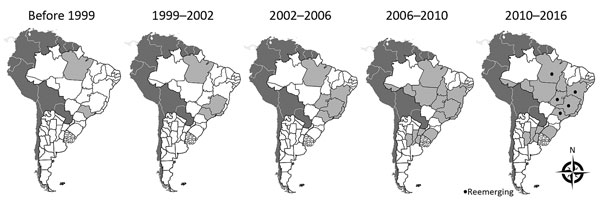Volume 22, Number 12—December 2016
Dispatch
Detection of Vaccinia Virus in Dairy Cattle Serum Samples from 2009, Uruguay
Figure 1

Figure 1. Chronologic representation of vaccinia virus (VACV) emergence and reemergence in South America. Dark gray indicates countries in which VACV outbreaks have not been officially described; light gray indicates states in Brazil, Argentina, and Uruguay where VACV outbreaks were detected by serologic or molecular testing; white indicates states in Brazil and Argentina where VACV has not been detected; black dots indicate areas where VACV is reemerging.
Page created: November 18, 2016
Page updated: November 18, 2016
Page reviewed: November 18, 2016
The conclusions, findings, and opinions expressed by authors contributing to this journal do not necessarily reflect the official position of the U.S. Department of Health and Human Services, the Public Health Service, the Centers for Disease Control and Prevention, or the authors' affiliated institutions. Use of trade names is for identification only and does not imply endorsement by any of the groups named above.